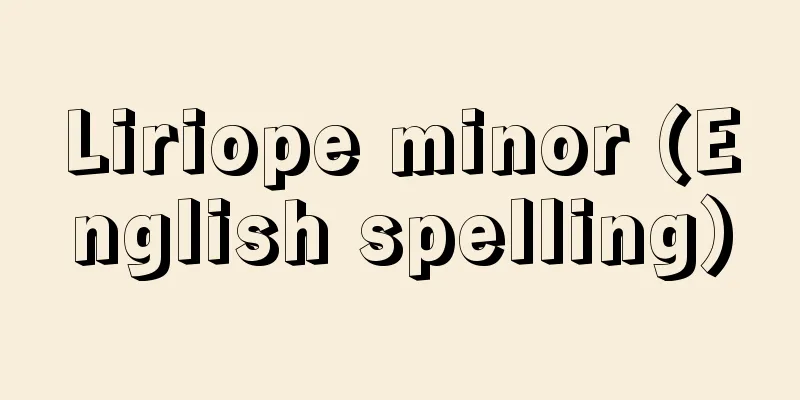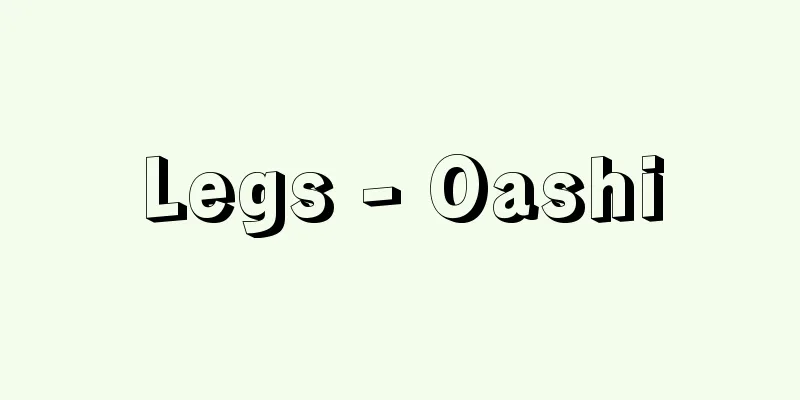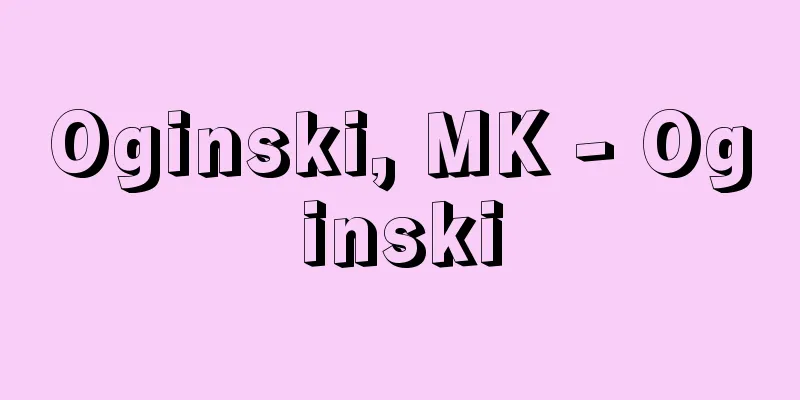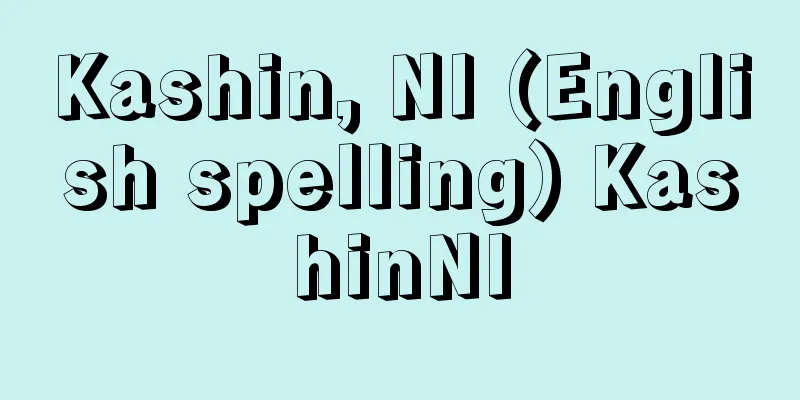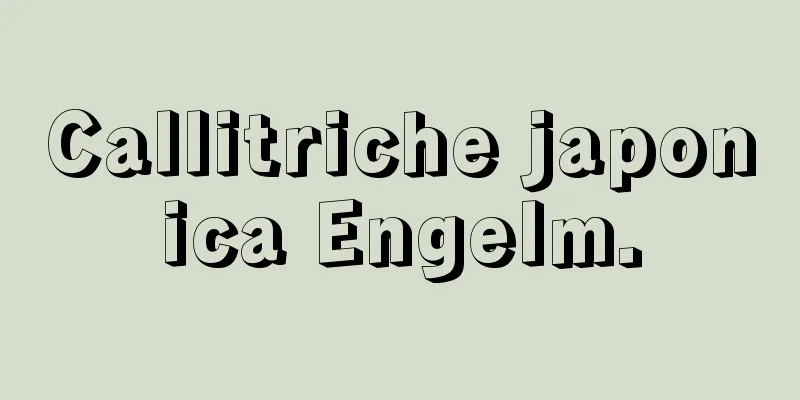Elite - Elite (English spelling)
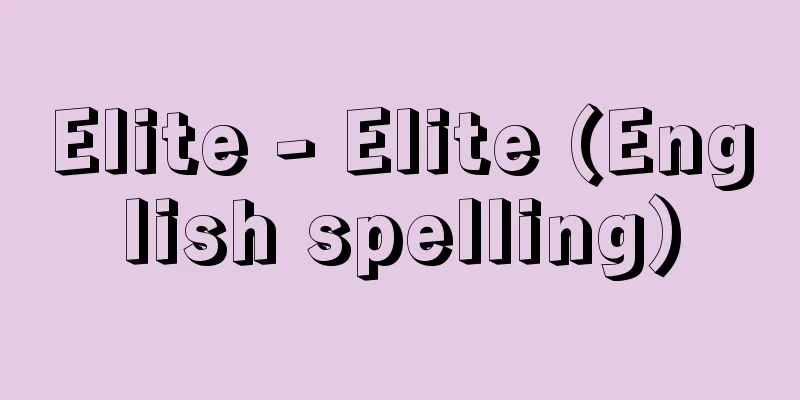
|
The word "elite" is generally used in various ways, such as those who are chosen (also written as "elected person"), those who are excellent, those who are in a leadership position, etc. Sometimes it is spoken of with an ideological connotation, and sometimes it is spoken of simply as being excellent. According to Makoto Aso (1932-2017), an educational sociologist and author of "Elite Formation and Education," the word "elite" was first used around the 17th century, and was used to refer to high-quality products, but later came to mean superior social groups such as elite military units and high-ranking aristocrats. The word "elite" has been interpreted in various ways, such as with an ideological smell, a moralistic, normative, or value-based connotation, or an emotional repulsion. Especially in Japan, after the Second World War, the word "elite" was perceived as anti-democratic and anti-egalitarian, and there was even a tendency to hesitate to talk about it. As British sociologist Thomas B. Bottomore (1920-1992) pointed out, "All theories of elites deny the existence of any real popular government," and the idea remains deeply rooted, so it has not been a subject for calm, objective discussion. Furthermore, there is a never-ending stream of articles linking elites to nationalistic eugenics and gifted education, pointing out their dangers. It is only since the mid-1980s that we have seen an increase in research and references to elites and elite education. [Kenji Yamauchi May 21, 2018] Pareto's theory of the eliteResearch on elites has a long history and a considerable body of research has been accumulated. One of the oldest studies is considered to be the essay "An Application of Sociological Theory" written by V. Pareto in "Review of Italian Sociology" in 1900. This essay was translated and published in Japan under the title "The Circulation of Elites." Pareto was a sociologist from an Italian aristocratic background, and a man of many talents who also made achievements in economics and psychology. He believed that all societies, regardless of the form of the system, are dominated by a small number of elites. He also pointed out that sometimes an elite as a whole replaces the existing elites. For Pareto, humans are never created equal, but are created unequal in intellectual ability as well as physical ability. This inevitably leads to social stratification. Although Pareto's theory of elites has been criticized for being ideological, he has consistently taken the stance of separating it from value and moral arguments as much as possible and discussing it mainly in terms of its social function. Furthermore, his elucidation of the necessity for the circulation of elites and the conditions for their occurrence had a major impact on later elite theory. [Kenji Yamauchi May 21, 2018] Mills' theory of elitesThe next most important study of elites was by C. W. Mills. In his masterpiece, The Power of the Elite, he argued that command posts (controlling positions) are concentrated among the elites in the three fields of politics, economics, and the military, concentrating power. Moreover, according to him, this layer is not bound by anything and does not take responsibility. His theory of elites is based on a pessimistic view of society in the United States of the 1950s, the time in which he lived. In his theory of elites, systems create people, which in turn create elites. Considering that prior to Mills, theories of elites that focused on individual career analysis tended to overlook the institutional aspect, Mills' achievements can be said to be significant. [Kenji Yamauchi May 21, 2018] Botmore's theory on elitesThen there is Botmore's research on elites. In his book Elites and Society, he summarizes the papers of past researchers on the relationship between democracy and the existence of elites, and between the ruling class and elites, but he is particularly aware of the Marxist camp's theories on elites and democratic society. What seems to be unique in this work is the debate over whether the pluralism of elites can guarantee the soundness of a democratic society, and whether democracy is guaranteed by competition between elites. In considering this issue, the conflict between the existence of elites and democracy, as well as the conflict between the existence of elites and social equality, emerges. In response to this issue, Botmore summarizes the criticism of the ideal of a classless, equal society in the form of "the danger that a classless society will bring about dictatorship in the intellectual sphere and political dictatorship," while stating, "While making concessions to the spirit of equality, theorists of elites try to defend the legacy of past unequal societies in various ways. They strongly insist on the absolute division between rulers and the ruled, and present it as a kind of scientific law. However, on the other hand, they reconcile democracy with the division into rulers and the ruled by defining democracy as a competition between elites. They acknowledge and justify the class division of society." He also sharply criticizes theorists of elites. As an example, Botmore criticizes the concept of "equality of opportunity" often advocated by elitists, stating that the concept itself presupposes inequality. For example, even in the case of education, the influence of social classes is strong, and equality of opportunity to receive an education can only be realized in a classless society or a society without elites. At the same time that Botmore criticized the Marxist camp's empty theory of equality regarding the elites, he also sharply criticized the conservative camp's empty theory of equal opportunity. [Kenji Yamauchi May 21, 2018] Elite educationHowever, since the 1980s, there has been a strong trend in the education field that education should be tailored to the individuality, abilities, and developmental stage of each child, that is, to special needs education. This trend was typically seen in neoconservative discussions in the UK and the US, and in the discussions of the Provisional Council for Educational Standards (1984-1987) in Japan. It is said that the negative effects of the traditional uniform education, or "bad equality," have become greater, and there is a trend in the field of education to reconsider elite education or education for the talented. This trend has since been carried on by the National Council for Educational Reform and the Education Reconstruction Council (a private advisory body to the Prime Minister), among others. Elite education can be said to be one of the issues that was brought about, or left unresolved, by the excessive egalitarianism that followed World War II. [Kenji Yamauchi May 21, 2018] Elite Educational InstitutionsExamples of elite educational institutions include prep schools in the United States, public schools in the United Kingdom, preparatory schools for Grandes Écoles attached to lycées in France, and gymnasiums in Germany. In Japan, the old high schools were often mentioned before World War II, and private six-year junior and senior high schools after the war. However, in today's world, where there are fewer highly educated people than in the past, there is a constant debate about what the relationship between mass education and elite education should be. For example, there are many points of contention, such as whether it should be done within the regular school education system or outside the system, whether it is good or bad for the state to be involved, whether it should be concentrated in a few educational institutions or dispersed among many institutions, and whether elite education is particularly necessary in a highly educated society, where elites in both quality and quantity have emerged from a completely laissez-faire state. It can be said that elite education or education for the talented tends to be positioned as one of the special needs, but there are also strong counterarguments from egalitarians. In Japan in particular, there are voices that look forward to the emergence of excellent elites with strong leadership, reflecting the confusion of the times, and there are also counterarguments to this. The debate surrounding elites and their education is one of the most heated. A notable characteristic seen in Japan since the 1990s is the differentiation between elite education and gifted education. Gifted education has been institutionalized in various forms in the field of education since the introduction of the "early admission" system. Even public high schools now have advanced courses. However, this gifted education has been introduced as an education that meets the special needs mentioned above, and in most cases it is advertised as being "not elite education." This is why elite education is becoming increasingly shunned while education based on ability is being realized. [Kenji Yamauchi May 21, 2018] "T.B. Botmore, Elites and Society, translated by Watanuki Joji (1965, Iwanami Shoten)" ▽ "C.W. Mills, Power Elites, Volumes 1 and 2, translated by Ukai Nobunari and Watanuki Joji (1969, University of Tokyo Press)" ▽ "V. Pareto, The Circulation of Elites: Sociological Theory and Applications, translated by Kawasaki Yoshimoto (1975, Kakiuchi Publishing)" ▽ "Asou Makoto, Elite Formation and Education (1978, Fukumura Publishing)" ▽ "Asou Makoto, Japan's Academic Elites (1991, Tamagawa University Press)" ▽ "Yamauchi Kenji, A Study of the Literary Elites: Their Social Composition and Higher Education (1995, Yuseido Publishing)" ▽ "Hashimoto Shinya et al., Exploring Modern Europe 4: Elite Education (2001, Minerva Shobo)" ▽ "Japan Comparative Education Association (ed.), Studies in Comparative Education No. 45" Special feature: "The state of talent education in various countries" (2012, Toshindo) ▽ "How to create elites: The sociology of the Grandes Ecoles" by Yasuo Kashiwakura (Chikuma Shinsho) [References] | | | | | | | |Source: Shogakukan Encyclopedia Nipponica About Encyclopedia Nipponica Information | Legend |
|
エリートということばは一般的には選ばれた者(選良とも表記される)、優れた者、指導的な立場にある者等々、多義的に用いられている。イデオロギー的な意味合いをもって語られるときもあれば、ただ単に優れているという意味合いをもって語られるときもある。教育社会学者で『エリート形成と教育』の著者である麻生誠(あそうまこと)(1932―2017)によれば、エリートということばが最初に使われたのは17世紀ごろのことで、とくに良質な商品をさして用いられていたが、その後、軍隊の精鋭部隊、上級貴族のような優越的な社会集団を意味するようになったという。エリートということばにイデオロギー的なにおいを感じとったり、道徳論的、規範論的、価値論的な意味合いを感じとったり、感情的に反感をもったり、さまざまな受け止め方がなされてきた。ことに日本においては、第二次世界大戦後、エリートといえば反民主主義、反平等主義のように受け取られ、語るのもはばかられるような傾向さえあった。 イギリスの社会学者であるボットモアThomas B. Bottomore(1920―1992)が指摘するように「あらゆるエリート論は、何らかの現実的意味における民衆による政府なるものの存在を否定する」という考え方も根強く残っているわけで、いわば冷静に、客観的に論じる対象ではなかったのである。さらに、国家主義的な優生学や英才教育論と結び付ける形で論じ、その危険性を指摘する論稿も後を絶たない。1980年代なかば以降、ようやくエリートないしエリート教育に関する研究や言及が多くみられるようになってきた。 [山内乾史 2018年5月21日] パレートのエリート論エリートの研究は歴史が古く、かなりの蓄積をもっている。V・パレートが1900年に執筆した『イタリア社会学評論』のなかの「社会学理論の一つの応用」という論文がもっとも古いものの一つと考えられる。この論文は日本では『エリートの周流』という題で邦訳刊行された。パレートはイタリアの貴族出身の社会学者であり、経済学や心理学の業績もある多才な人で、体制の形態にかかわらず、すべての社会は少数エリートによって支配されると考えた。そして、ときには総体としてあるエリートが既成のエリートにとってかわることもあると指摘した。パレートにとっては、人間はけっして平等につくられたものではなく、身体的能力においてと同様、知的能力においても不平等につくられたものなのである。そこから社会の階層化が不可避的に生じる。パレートのエリート論は、イデオロギー的であるという批判はあるものの、価値論的、道徳論的な議論から可能な限りエリート論を切り離し、その社会的機能を中心に論じようという姿勢が一貫している。また、エリートの周流の必然性と生起の条件を解明したことは後のエリート論に大きな影響を与えた。 [山内乾史 2018年5月21日] ミルズのエリート論ついで重要なエリート研究はC・W・ミルズによるものである。彼は代表作『パワー・エリート』において、政治・経済・軍事の3領域のエリートにコマンド・ポスト(支配地位)が集中的に配分され、権力が集中すると述べた。しかも、彼によればこの層は何ものにも拘束されず、責任をとることもないのである。彼の生きた1950年代のアメリカ合衆国に対する悲観的な社会観に基づくエリート論といえる。彼のエリート論では制度が人をつくり、エリートをつくるということになる。ミルズ以前の個人のキャリア分析を中心にしたエリート論は制度的側面を見過ごしがちであったことを考慮すれば、ミルズの業績も大きいといえる。 [山内乾史 2018年5月21日] ボットモアのエリート論さらに、ボットモアのエリート研究がある。彼は著書『エリートと社会』において、民主主義とエリートの存在の関係、支配階級とエリートとの関係について過去の研究者の論稿を整理しているが、とくに意識しているのはマルクス主義陣営のエリート論、民主主義社会論である。なかでも独特と思われるのは、エリートの多元性が民主主義社会の健全性を保証しうるのか、民主主義は諸エリート間の競争によって保証されるのかという議論である。この問題を考察していくうえで、エリートの存在と民主主義との相克の問題と並んで、エリートの存在と社会の平等性との相克の問題が現れる。この問題に対して、ボットモアは「階級なき社会が知的領域における独裁と政治的独裁とをもたらす危険がある」という形での階級なき平等社会の理想に対する批判を整理する一方、「諸エリート論者は平等の精神に譲歩をしながらも、他方では種々の方法によって過去の不平等社会からの遺産を擁護しようとする。エリート論者らは、支配者と被支配者との絶対的分裂を強く主張し、それを一種の科学的法則であるかのごとく提示する。しかし、他方では民主主義を諸エリート間の競争と定義することにより、民主主義とかかる支配者と被支配者への分裂という事態とを調和させる。エリート論者は、社会の階級分化を承認し正当化する」と述べ、エリート論者にも鋭い批判の矢を向ける。その一例として、ボットモアはエリート論者がしばしば主張する「機会の平等」という概念を批判し、「機会の平等」という概念そのものが不平等を前提としていると述べている。たとえば、教育ひとつをとってみても、社会階級の影響力が強固であり、教育を受ける機会の均等などは階級なき社会か、エリートなき社会でないと実現しえないのである。ボットモアはエリートを巡るマルクス主義陣営の空疎な平等社会論を批判するのと同時に、保守主義陣営の空疎な機会均等論をも痛烈に批判したわけである。 [山内乾史 2018年5月21日] エリート教育しかし1980年代以降、教育の現場において子供の個性・能力・発達段階に応じた教育、いわゆるスペシャル・ニーズに応じた教育を施すべきだという議論が大きな流れを形成している。これはイギリス、アメリカの新保守主義的な議論、日本の臨時教育審議会(1984~1987)の議論に典型的にみられた。従来の画一的な教育、「悪平等」のもたらす弊害が大きくなってきたとされ、教育の現場においてもエリート教育、あるいは才能ある者の教育を見直そうという動向がある。こういった流れはその後、教育改革国民会議、教育再生会議(首相の私的諮問機関)等に引き継がれている。いわば第二次世界大戦後の過度な平等主義がもたらした、あるいは積み残してきた課題の一つがエリート教育であるといえる。 [山内乾史 2018年5月21日] エリート教育機関エリート教育機関としてアメリカ合衆国のプレップ・スクール、イギリスのパブリック・スクール、フランスのリセ付設のグランゼコール準備級、ドイツのギムナジウムがあげられ、日本については第二次世界大戦前は旧制高等学校、戦後は私立中高6年一貫校がよくあげられる。しかし、かつてのような高学歴者の少ない時代とは異なる現代において、大衆教育とエリート教育がどういう関係にあるのがよいのか、議論は絶えない。たとえば、正規の学校教育体系内でやるのか体系外でやるのか、国が関与するのがいいのか悪いのか、一部の教育機関で集中的に行うのか、多くの機関に分散させるのか、高学歴社会ではまったくのレッセ・フェール(自由放任)状態から質・量とも十分なエリートが登場するため、とくにエリート教育はいらないのか、論点も多岐にわたる。エリート教育あるいは才能ある者に対する教育はスペシャル・ニーズの一つとして位置づけられる傾向にあるともいえるが、平等主義者の根強い反論もある。ことに日本では時代の混迷を反映して強力なリーダーシップをもった優れたエリートの登場を待望する声もあれば、それへの反論もある。エリートおよびその教育を巡る議論はもっとも熱い議論の一つであるといえよう。 なお、1990年代以降、日本でみられる際だった特徴は、エリート教育と才能教育との分化である。才能教育は「飛び入学」制度の導入以降、さまざまな形で教育現場において制度化されている。現在では公立高校においてすら特進コースが設置されているほどである。しかし、これらの才能教育は、先述のスペシャル・ニーズに応じる教育であるとして導入されており、ほとんどの場合、「エリート教育ではない」ことをうたっている。能力に応じた教育が実現する陰でエリート教育がますます忌避されるようになっているゆえんである。 [山内乾史 2018年5月21日] 『T・B・ボットモア著、綿貫譲治訳『エリートと社会』(1965・岩波書店)』▽『C・W・ミルズ著、鵜飼信成・綿貫譲治訳『パワー・エリート』上下(1969・東京大学出版会)』▽『V・パレート著、川崎嘉元訳『エリートの周流――社会学の理論と応用』(1975・垣内出版)』▽『麻生誠著『エリート形成と教育』(1978・福村出版)』▽『麻生誠著『日本の学歴エリート』(1991・玉川大学出版部)』▽『山内乾史著『文芸エリートの研究――その社会的構成と高等教育』(1995・有精堂出版)』▽『橋本伸也他著『近代ヨーロッパの探求4 エリート教育』(2001・ミネルヴァ書房)』▽『日本比較教育学会編『比較教育学研究45号 特集「各国の才能教育事情」』(2012・東信堂)』▽『柏倉康夫著『エリートのつくり方――グランド・ゼコールの社会学』(ちくま新書)』 [参照項目] | | | | | | | | |出典 小学館 日本大百科全書(ニッポニカ)日本大百科全書(ニッポニカ)について 情報 | 凡例 |
<<: Eridu - Eridu (English spelling)
>>: Erythematodes (English) German
Recommend
Ajirogondayu
⇒ Hironori Ajiro Source: Kodansha Digital Japanese...
Ugabu - Ugabu
…The Old Testament also lists many musical instru...
Nummulites (English spelling)
A genus of large foraminifera that appeared in the...
Scale foil - Urokohaku
…The color of the fabric changes depending on the...
Jacobo Arbenz Guzmán
1913‐71 Guatemalan military officer and politician...
"The Welt ist schön" (English: The Welt ist schön)
… [Toi Yoshio] [photograph] Neue Sachlichkeit in ...
position light
…They are broadly divided into those intended to ...
Molecular spectrum
The spectrum of light absorbed or emitted by a mo...
lateral ocellus
…An eye with a simple structure different from th...
Virginia City
A town in western Nevada, USA. It is located in th...
Struve, GWLvon (English spelling)
...The following six people are famous as astrono...
The gods are thirsty
...This prompted the author to gradually develop ...
Buxus
...An evergreen shrub of the Buxaceae family that...
Magritte - René Magritte
Belgian painter. Born on November 21 in Lessines,...
Cheerleader
Cheerleader: The leader of a cheer squad. Also, a ...
